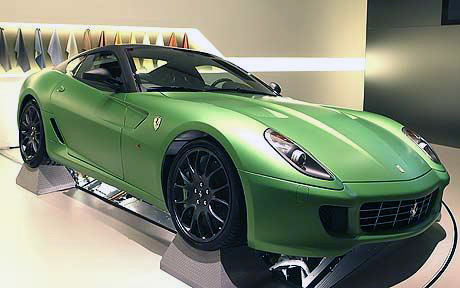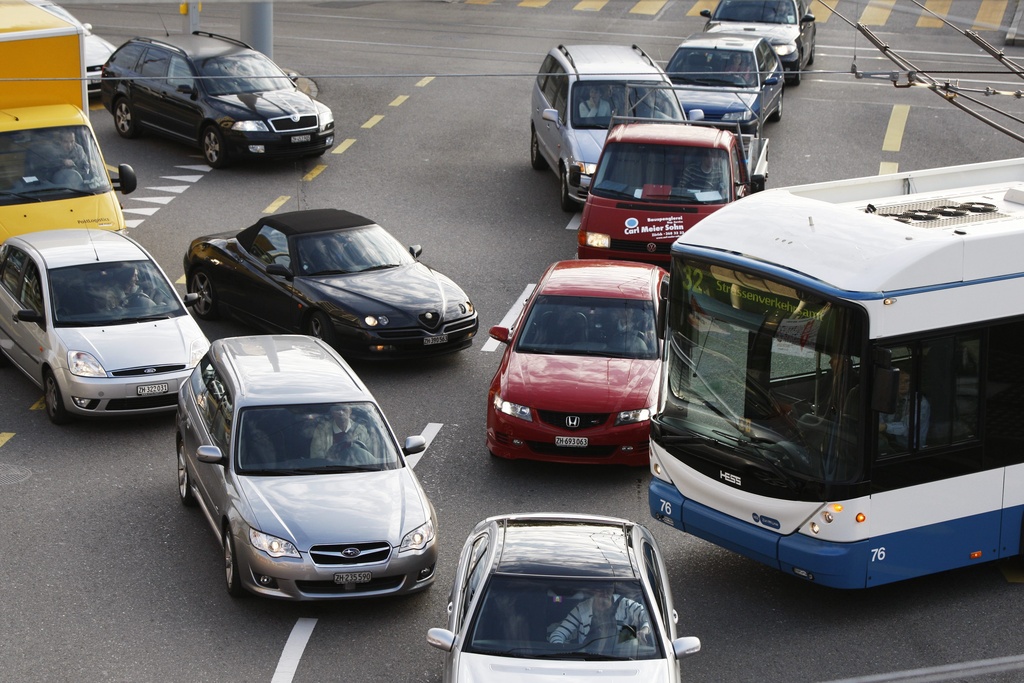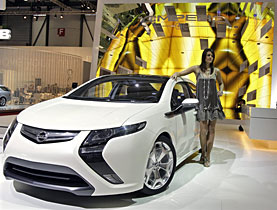Electric cars reveal positives and negatives

Predictions about electric cars having a bright future have been around for 25 years, but the reality in Switzerland is very different.
While they are well represented at this year’s Geneva Motor Show, you won’t find many on Swiss roads. In 2009, of the 266,018 new cars sold, only 53 were powered by electricity.
There are experts who say that the hour of the electric car has arrived, although others remain sceptical. Some argue that if these vehicles were widespread, new nuclear power stations would have to be built.
The problems associated with electic cars are well known: they cannot travel as far as conventional cars, they are less powerful but more expensive, and the batteries are heavy. Recharging points are also few and far between.
In addition, the mass production of these cars announced a decade ago has not yet appeared.
For several years the car industry has been putting more emphasis on hybrid cars, which marry the power of an economical petrol engine with that of an electric motor. An increasing number of car makers are joining the Japanese pioneers of this technology.
“At the Geneva Motor Show you can see a hybrid or an electric car – sometimes both – on practically every stand. Even Mercedes and Porsche have joined the trend,” said Rudolf Blessing, spokesman for the Swiss Association of Car Importers.
Increase in hybrids
The association expects an increase in the sale of hybrids, despite their current rather high price.
“The problem is that hybrid engines – like electric motors – are clearly much more costly to produce than petrol or diesel engines,” Blessing explained. He added that producing a small hybrid car made no sense from an economic point of view.
For some, this doesn’t matter. Yves Lehmann, president of the Swiss e’mobile association, which has been campaigning since 1980 for fuel-efficient and low-emission vehicles, says electric is going to win the day over hybrid.
“We’re beginning to see really good performance solutions, with electric cars having a range of 120-200 kilometres,” he said. “And you can recharge in 12-15 minutes, or the time it takes to drink a coffee at a motorway service station.”
Let’s imagine that in ten years 15 per cent of private vehicles in Switzerland are electric. According to a study commissioned by Alpiq, the Swiss leader in electricity sales, that would be enough to lower road traffic emissions by ten per cent, thereby satisfying the greenhouse gas reduction goals pledged by Switzerland at last year’s Copenhagen climate conference.
“Pure optimism”
Lehmann would like to believe the market share would reach 15 per cent but he admits it’s also partly because he’s “an optimist by nature”.
There is more scepticism among green campaigners. Cyrill Studer, who is behind the climate and transport campaign at the non-governmental Greenpeace Switzerland, admits that “electric cars could have a future on Swiss roads”, but doesn’t want to give them carte blanche.
“Electric motors are more efficient than those that run on fuel,” he said. “But there are questions that the car industry will not answer.”
The production of batteries, whether for electric or hybrid cars, needs large quantities of neodymium, terbium and dysprosium. These chemical elements are in such demand that the situation resembles a gold rush.
Lithium is also required, which is putting pressure on the rare deposits known in Latin America, Tibet and Australia.
Nuclear powered
But what ecologists really don’t like is the idea of connecting the electric car’s plug to a socket, knowing that 40 per cent of the electricity comes from nuclear power. They also realise that an increase in these cars will result in a rise in electricity consumption.
According to the Alpiq study, if 15 per cent of the cars on Swiss roads were electric, consumption would rise by 1.2-1.7 billion kWh, or 1.8-2.6 per cent of Swiss electricity production in 2007.
Fabrizio Noembrini at the Federal Institute of Technology in Zurich is less optimistic. In his capacity as head of the institute’s Energy Systems group, he has calculated that if all cars in Switzerland were electric, electricity consumption could increase by 30-40 per cent. This would mean that one or two new nuclear power plants would be needed satisfy the demand.
Even if this estimation is “at the top end of the scale”, as Greenpeace’s Studer admits, campaigners know that renewable energy sources are still far from being able to cope with such an increase.
Greenpeace is also advocating ideas that offer a different kind of mobility. For example, town and country planning which would allow people to do most of their journeys on foot, bike or by public transport.
And if we really need vehicles, Studer would prefer those that only transport people and banning engines that are “too heavy, which have more horsepower than a truck and can go from 0 to 100km/h in X seconds”. These, he said, served only “to flatter egos – especially male ones”.
“Too many car makers who are now moving to electric or hybrid still have this way of thinking,” he said.
For Studer, the place for this kind of car is “no longer on the road, but in the museum”.
Marc-André Miserez, swissinfo.ch (Adapted from French by Robert Brookes)
53 out of 266,000 (in round figures): this is the number of new electric vehicles compared with the total number of new cars sold in Switzerland last year. In 2008, it was 21 out of 288,000, in 2007 it was 19 out of 284,000 and in 2006, seven out of 269,000.
1.9%: this is the proportion of new cars with “alternative propulsion” sold in Switzerland in 2009. In this category, the importers include hybrids, cars that run on gas, those on bio-ethanol and electric vehicles. Of the remainder, two-thirds run on petrol and a third on diesel.
SFr30,000 ($27,940)-SFr60,000: this is the minimum price you have to pay for an electric car in Switzerland today. The majority are nothing more than conventional cars rebuilt with electric motors. Car makers say that when there is mass production of electric cars, there will be significant price reductions.
The 80th Geneva International Motor Show, which runs until March 14, is expected to attract some 700,000 visitors.
Around 100 world and European premieres are announced, with 16 dedicated to electrical cars alone. Around 40 per cent of visitors travel from outside Switzerland, with many from neighbouring Germany, France and Italy.
The organisers claim that the Geneva Motor Show generates SFr300 million ($254.3 million) in direct and indirect income.
The best-selling car in Switzerland is the VW Golf. After VW, the most popular brands are Audi, Renault, Ford, Opel and Toyota.
In 2009 Swiss garages sold 266,018 cars – 7.8 per cent fewer than in 2008. But there are signs that sales have started to pick up: +5.8 per cent in January 2010, compared with a year earlier.
There are some 4.6 million cars in circulation in Switzerland. Since 1970 the number of vehicles per 1,000 inhabitants rose steadily. But this figure dropped from 610 in 2008 to 597 last year.

In compliance with the JTI standards
More: SWI swissinfo.ch certified by the Journalism Trust Initiative















You can find an overview of ongoing debates with our journalists here . Please join us!
If you want to start a conversation about a topic raised in this article or want to report factual errors, email us at english@swissinfo.ch.